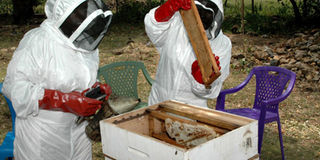Study: Kenyan bees resistant to environmental hazards

Bee keepers harvesting honey. A study has shown that Kenyan honey bees are largely resistant to environmental hazards that have seen bee populations diminish in other parts of the world, especially in Europe and America. PHOTO/JACOB OWITI.
What you need to know:
- The discovery, made by a group of scientists at the Nairobi based International Centre for Insect and Plant Entomology (ICIPE) have astounded researchers.
- African honey bees remain unaffected by a number of diseases that have been linked to significant colony losses in the United States and Europe.
- In Kenya, self-help groups are currently undergoing training on modern methods of raising honey bees.
Kenyan bees might be the hope for saving the world’s bee population from extinction after scientists discovered pesticide use was killing vast colonies in Europe and America.
The discovery, made by a group of scientists at the Nairobi based International Centre for Insect and Plant Entomology (Icipe) have astounded researchers.
This follows the discovery of the bees’ outstanding resilience in the face of pests and diseases blamed for diminishing bees’ population elsewhere.
The just released year-long study says Kenyan bees will be closely monitored in the coming years to establish the ‘power’ behind their high resistance that has seen populations flourish with ease with minimal application of pesticides on beehives.
UNAFFECTED BY DISEASE
Icipe’s beekeeping lead scientist of the study, Dr Eliud Muli said African honey bees remain unaffected by a number of diseases that have been linked to significant colony losses in the United States and Europe, raising the prospect that African honey bees may possess ‘novel resistance mechanisms’ to disease that warrant further investigation.
“Our studies suggest that honey bee populations in East Africa appear to be largely resistant or tolerant to the parasites and pathogens that threaten honey bee populations in other parts of the world, and are not yet significantly affected by other stressors, such as exposure to environmental toxins,” the study conducted by ICIPE jointly with the Pennsylvania State University Centre for Pollinator Research says.
This has seen ICIPE receive Sh1.6 billion for expansion and construction of the world’s biggest bee reference laboratory with refurbishment works going on in other four satellite ICIPE laboratories, in Burkina Faso, Cameroon, Ethiopia and Liberia.
The establishment of the reference lab will be done in partnership with the African Union Inter-African Bureau for Animal Resources (AU-IBAR) benefitting from a generous contribution of 1 million Euro (Sh1,6 billion) from the European Union aimed at enhancing healthy proliferation of bee colonies.
The study also laments that though bee populations in Kenya also recorded a noticeable decline, this was attributed to increased deforestation to pave way for new settlements, as cities expand and previously pristine habitat is converted into agricultural land or for other uses.
The state-of-the-art Bee Health Reference Laboratory is scheduled for opening in July 2014. It will enhance ICIPE’s monitoring and surveillance capabilities for African bee diseases, solidify reporting and response systems for bee pests and diseases, and even to analyse bees and bee products for the presence of pesticide residues.
ICIPE is the only research institution of its kind in the world dedicated exclusively to the study of insects and is positioned to become the leading centre of knowledge on bees and pollinator health in Africa.
“The low level of pesticides in beehives from across Kenya, particularly when compared to levels in developed countries, suggests pesticide use play only a limited role in honey bee health in Kenya at this time.
Unlike in Kenya, over 129 different pesticide-related chemicals have been found in US bee colonies, with an average of 6 chemicals per colony,” the study states adding that the chemical residues found in US beehives is still negligible.
FUNGAL PARASITE
Dr Muli, said that a fungal parasite, Nosema apis, has been reported for the first time in East Africa in addition to three honey bee viruses, namely deformed wing virus (DWV), black queen cell virus (BQCV) and acute bee paralysis virus (ABPV).
However, these do not pose a threat since the bees have proved to be resistant to these invasive pests.
The report adds that beekeepers should avoid introducing aggressive chemical treatments for the honey bee diseases, since honey bee health seems entirely unaffected adding that monitoring should continue in case that situation changes.
Bees are economically important due to their honey and wax which are highly sought for everyday use in various applications.
A half kilo of refined honey sells for an average of Sh500 in local supermarkets.
However, the honey currently available for sale is not enough to meet the high demand thereby making bee-keeping a thriving enterprise.
In Kenya, self-help groups are currently undergoing training on modern methods of raising honey bees.





